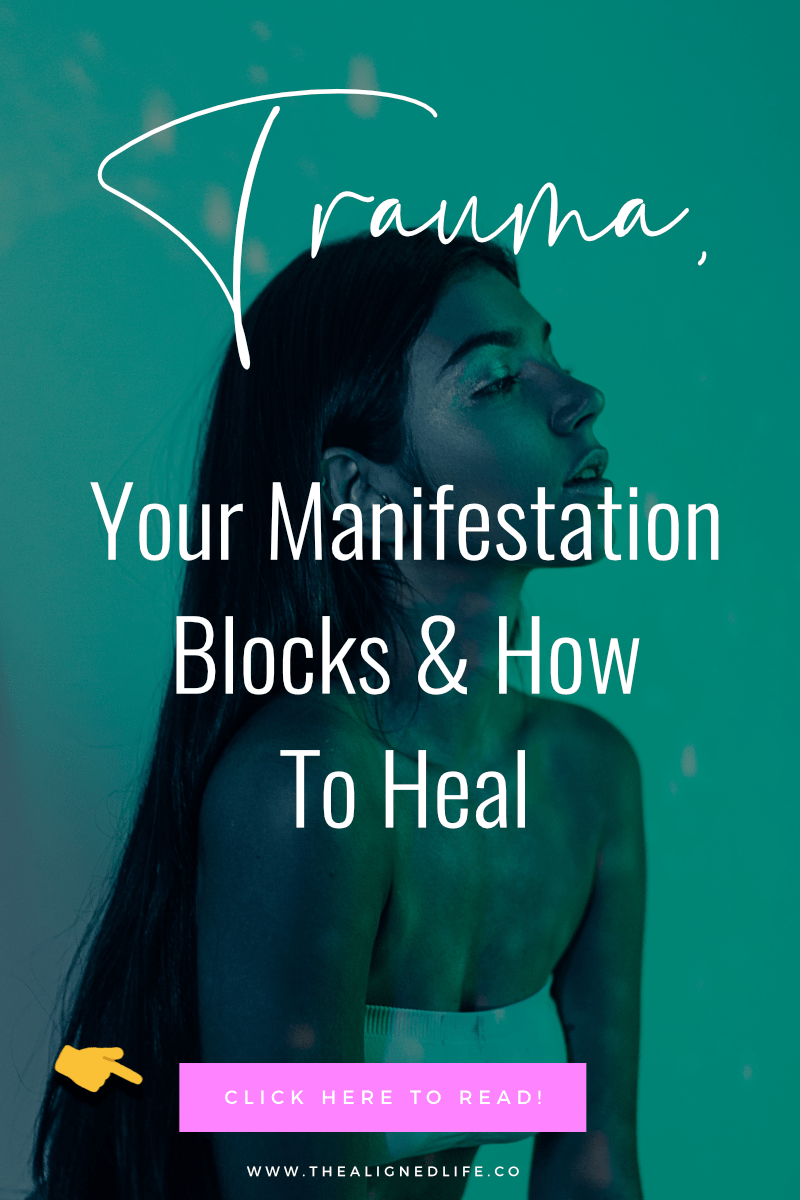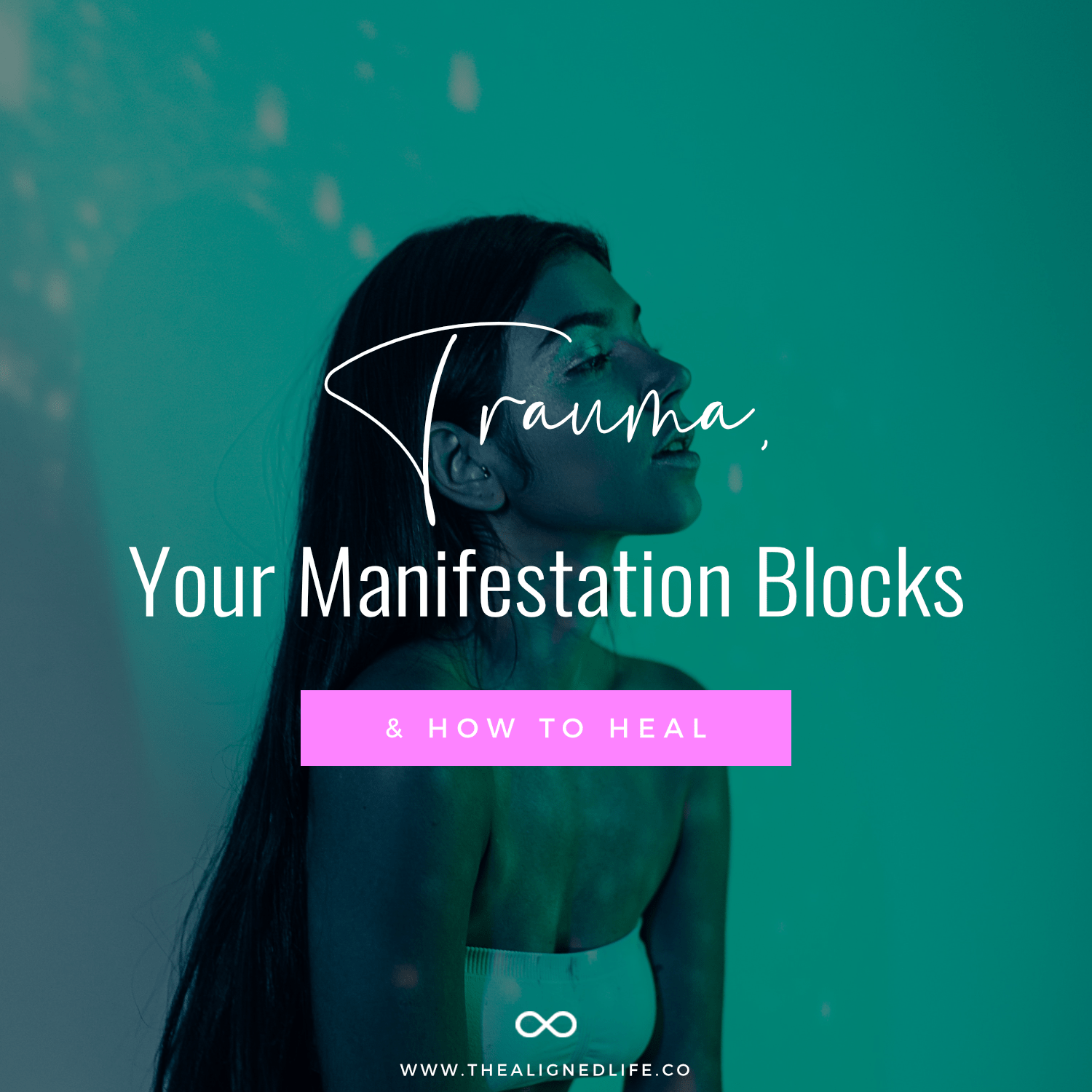Small-T Trauma & Your Manifestation Blocks
In my work as a coach and inside Heal’d virtual healing studio, I frequently bring up the topic of small-t trauma and your manifestation blocks.
However, I know that even the word trauma itself can be triggering. It brings up reactions in people like: “I’ve never experienced anything like that” or “My childhood was really good actually.”
In reality, no childhood is perfect. No matter how well-intentioned and loving your parents were, it’s likely that they missed the mark in one way or another.
This work isn’t about blaming them for that. (They’re imperfect humans, just like us!) And it’s not about creating a new negative reaction now about something from the past.
It’s more like we’re finding the map to the deeply buried landmines which are deeply buried in our subconscious mind.
These “landmines” are not just unpleasant memories from our past. Even if you don’t consciously think about them much anymore, you probably “learned” something from this experience.
Our brains’ number one job is to protect us from harm (so that we stay alive!). However, our brain processes emotional and physical pain in the same way.
When you have a hurtful emotional experience as a child, your brain is going to try to “protect” you from ever experiencing that again. This creates a protective mechanism–or a new behavioral pattern that we think will create the opposite result.
For example:
As a child, you were wandering through the toy store and came across something absolutely amazing (and unknowingly to you, expensive! You turned to tell your parent: “I want this!” But instead of your parent simply saying something like “Maybe one day”, they turned to you and said: “That’s way too expensive for people like us! Who do you think we are?”
Time went on. You grew up. That moment in the toy store seems a million miles behind you. And yet somewhere in the back of your mind, when it comes to spending money (especially on nice or expensive things!) there’s a voice telling you that you’re not worthy of that, you shouldn’t even bother asking, nice or expensive things just aren’t for people like you.
Yes, this is miles away from the trauma we tend to think of (neglect, abuse, etc.) But the same process happened in your mind. You were expressing normal childhood desire and excitement but at that moment, you were met with shame and judgment–and you’ve secretly brought that shame and judgment along with you for the rest of your life.
Trauma Is Subjective
I always get the sense that people are looking for a cut-and-dried answer about what is traumatic and what isn’t. But the truth is, that’s simply not how it works. Emotions and experiences are always subjective.
We all have different experiences, coping mechanisms, and levels of support. Something that one person interpreted as traumatic might barely register to someone else. While you might have experienced trauma in a certain situation, a sibling or someone else in a similar situation might not.
That doesn’t mean you shouldn’t have had your experience. We’re all different. Different things trigger different people. We all needed and craved support in different ways. So the ways in which we experience pain are wildly different too.
When someone invalidates your pain or your experience, you only learn how to minimize it or just not talk about it. The coping mechanisms that make the people around you comfortable with you are not healing tools. Your subconscious mind always remembers your truth.
Small-T Trauma vs Big Trauma
Emotional pain always impacts the brain in the same way. Also remember, our brain interprets emotional pain as equal to physical pain! In other words, your brain takes it very seriously whether it’s “logical” or not.
However, “big” trauma (aka PTSD or CPTSD) occurs when you have a “bigger” reaction or have the same experience over and over again. It’s the same experience of pain, except that it’s been wired more deeply into your brain. And will require a bit more work to heal! If this is you, I strongly suggest that you work through this with a professional.
Talking about small-t trauma is not about minimizing the experiences of people who have survived abuse, etc. Sadly, we live in a society where it’s socially acceptable to compare our pain. (“You shouldn’t feel like that because X had it worse.”) I call this The Pain Olympics–and unfortunately, healing pain doesn’t work by making comparisons.
Here’s how I think about it this: if pain is a universal language, then shouldn’t healing be as well?
The more we collectively understand pain, trauma, and emotions, the better off society will be.
Sources of Trauma
Small t-trauma can basically be boiled down to one simple concept: a time when you felt unsafe.
To be clear, whether or not you actually were safe has nothing to do with it! Your experience is valid, even if you were a child, even if you didn’t fully understand what was happening around you.
As a child, you were entitled to have normal childhood needs. Those include your basic needs (roof over your head and food on the table) but also your social, spiritual, and emotional needs. These needs are still valid, whether or not your caretakers were equipped to meet them. If those needs weren’t met, you probably felt unsafe, even if there was no physical danger present.
Examples of How Small-T Trauma Is Created
For example, some children are simply expected to grow up fast. Their parents rely on them emotionally using them, like a friend. Other times, children are shamed for their needs, like just being hungry! Their parent is actually busy or stressed about money but they take it out on the child.
Another way to think about trauma is simply too much too fast. Sometimes trauma doesn’t come from what we think of as “bad” experiences.
For example: maybe your parents won the lottery. But after that happened, they pulled you out of your school and transplanted you to a new neighborhood where you didn’t fit in.
To adults, the idea of winning the lottery, having more money and a bigger house sounds great. But perhaps as a child, you found the whole experience overwhelming and scary–and perhaps you have a complicated relationship with money as a result.
Symptoms of Unprocessed Small-T Trauma
- Hyper-aroused, always on edge, unable to relax
- Dissociation or memory loss
- Digestive issues
- problems sleeping
- Fight or flight for extended periods of time (or most of your life!)
- Removed from body
- Numbness emotionally or physically (ie. during sex)
- Fractured or non-linear memories
How Trauma Creates Manifestation Blocks
Now I bet you have the million-dollar question: what does trauma have to do with manifestation?
No matter what the experience was for you, it was more than just that moment in time. Our brains are constant meaning-making machines. They’re also constantly scanning the world for perceived danger and trying to prevent us from experiencing any more of it.
When you’re a little kid, you probably touched the hot stovetop only once before your brain learned that it was hot and could hurt you.
Surprisingly, the same thing happens with emotional pain. When we experience something, our brain does its best to try to prevent us from experiencing that pain again.
Then it creates a protection (or coping) mechanism.
For example, if you learned that your parents didn’t care about your feelings, you probably learned how to hide those feelings. Maybe you stopped talking about them or you learned to put on a “brave” face no matter what.
Those adaptive mechanisms might not seem so bad. But more often than not they create problems of their own.
For Example
To continue the above example, someone who learned not to express their feelings might have problems in their romantic relationships.
As an adult, they want love. They crave it. But try as they might to manifest it, it never really works out for them. But the worst part is that they can’t see this process within themselves. Instead, they experience romantic love as complicated and dangerous and the situation never improves.
This is exactly why subconscious work is so crucial for those of us with stubborn manifestation blocks. (ie. almost all of us!) This is also why it’s so simple to manifest some things and not others. The things that come through easily are showing you where you’re not blocked.
Now just imagine: what would your whole life be like if you were unblocked?
How To Find Your Small T-Trauma Blocks
Think about what you’re trying to manifest (specifically, about something you’re struggling with or haven’t been able to manifest.)
Now, scan back in your mind.
Some Questions To Ask Yourself:
-
Is there a traumatic moment from your past that might be related to this issue?
What did you experience in that moment?
Did your brain “learn” something from that experience?
Now, if you didn’t have that experience, who would you be? How would you feel or behave? What else might be different?
This simple exercise will give you an idea of where you’re blocked and what you need to work on in order to get unblocked.
It’s a powerful first step! But if you need more help with this, doing some deep healing and subconscious reprogramming work is the next.
No matter what you experienced, you are more than capable of healing yourself and programming yourself for what you really want to experience in life. Stop letting your past define you! Start living for your future through healthy emotional processing.

Love This Post? Then Save It To Your Manifestation Board On Pinterest!

- Seeing 222 Everywhere? The Meaning of Angel Number 222 - April 16, 2024
- 10+ Spiritual Shows To Watch On Netflix - April 9, 2024
- Sacral Authority Type | Human Design Explained - April 8, 2024

